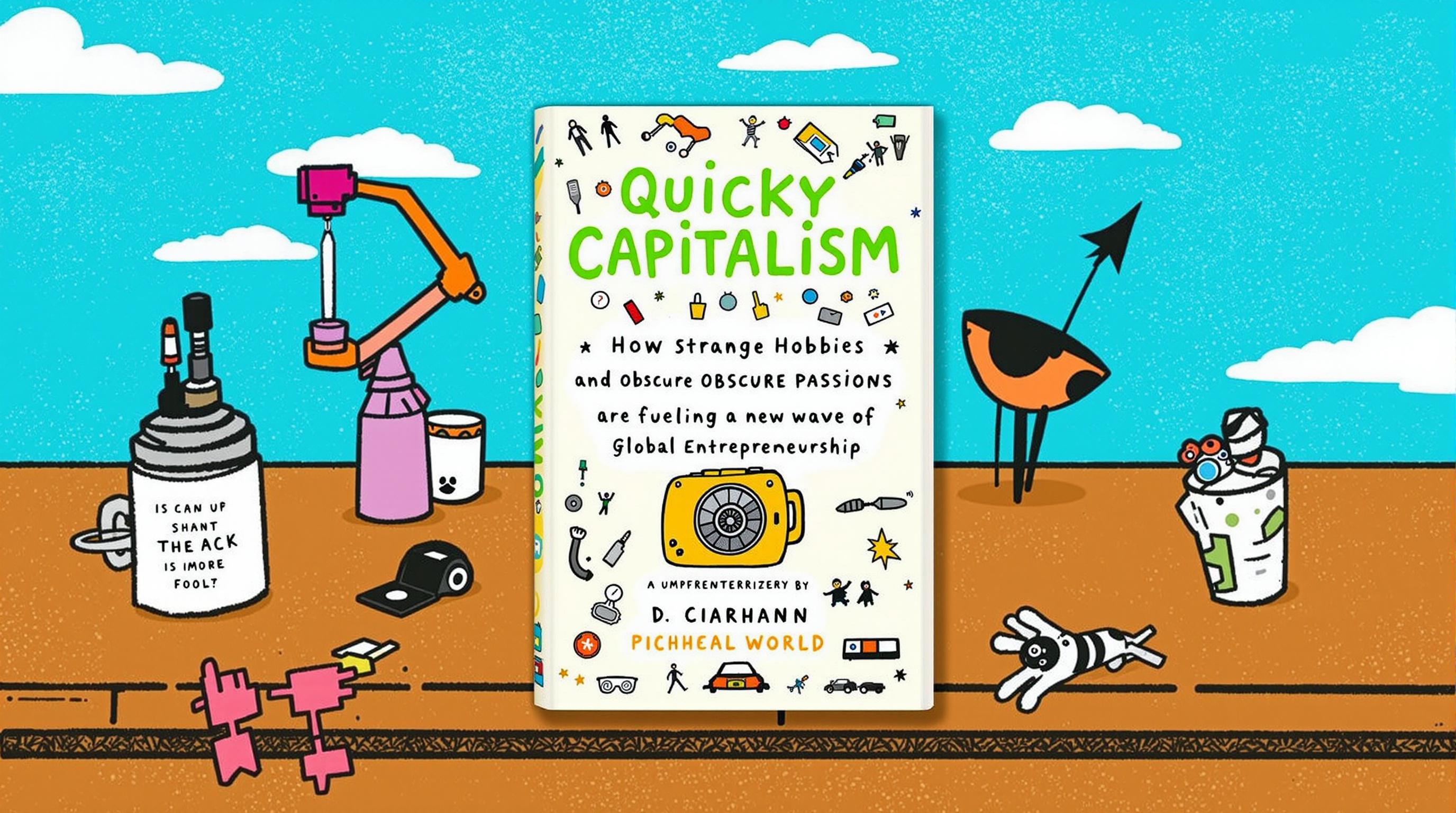Related Articles
- Invisible Threads: How Cultural Heritage Fuels Economic Growth in Off-the-Radar Communities
- How Unconventional Hobbies Can Boost Your Income: Exploring Unlikely Paths to Financial Enlightenment
- Uncommon Currents: How Waterways and Navigation Shaped Unexpected Economic Trajectories in Historical Contexts
- Whispers of Change: The Unlikely Role of Folklore in Crafting Today’s Privacy Policies and Data Protection Laws
- Surreal Shifts: The Unforeseen Role of Psychedelic Wellness in Global Consumer Preferences
- Unveiling the Financial Folly: How Conspiracy Theories Influence Market Behavior and Investor Sentiment
Quirky Capitalism: How Strange Hobbies and Obscure Passions are Fueling a New Wave of Global Entrepreneurship
Quirky Capitalism: How Strange Hobbies and Obscure Passions are Fueling a New Wave of Global Entrepreneurship
Quirky hobbies and obscure passions are transforming the landscape of entrepreneurship, leading to a new wave of global business driven by individual interests and creativity. From unique niche markets to strange ideas that resonate with audiences, unconventional pursuits are becoming not just pastime activities but lucrative ventures.
Introduction: A Passionate Shift
In today’s world, where the traditional notion of employment is evolving, quirky capitalism—fuelled by strange hobbies and obscure passions—is taking center stage. Entrepreneurs are no longer bound by conventional 9-to-5 job structures; they are instead carving out their unique spaces in a crowded marketplace. And why not? The joy of merging passion with profit opens up a treasure trove of possibilities.
The Rise of the Unconventional: A Statistical Dive
According to a report by the Global Entrepreneurship Monitor (GEM), 50% of adults aged 18-34 across the globe consider entrepreneurship a viable career option. This statistic reflects a significant shift in mindset, particularly among younger generations. Driven by an array of influences, from social media to peer success stories, an astounding number of individuals are ready to take the plunge into the entrepreneurial deep end.
Personal Stories: The Quirky Capitalists
Let’s take a moment to highlight a few inspiring stories of entrepreneurs whose strange passions turned lucrative. Meet Dave Hakkens, a Dutch designer who developed a following for his obsession with recycling. He founded Precious Plastic, an initiative that allows people to recycle plastic and create their own products. What started as a niche project has blossomed into a global phenomenon, showcasing how passion for the environment can drive innovative business solutions.
The Journey of a Potato Chip Artist
Not all entrepreneurs have to go the eco-friendly route, though. Enter the world of the potato chip artist, a title held by Ben Davis, who decided to turn bags of crisps into canvases. This humorous journey began when he posted his creations on social media. Fast forward two years, and he has amassed an online following of tens of thousands and turned this peculiar hobby into a thriving merchandising business. Davis’ work exemplifies how humor and creativity can resonate with audiences longing for novelty.
The Power of Community: Niche Markets Are Thriving
Another significant factor driving quirky capitalism is the advent of online platforms that encourage niche communities. For instance, sites like Etsy and Redbubble have empowered artists and hobbyists to sell their one-of-a-kind creations without the need for traditional retail spaces. According to Etsy’s Seller Census, 89% of their sellers are women, and more than half are between the ages of 25 and 34, suggesting that a youthful, creative demographic is making waves in the entrepreneurial waters.
Obscure Passions: From Ghost Tours to Competitive Duck Herding
Who said entrepreneurship can’t be fun? A quirky pastime like ghost tours has turned into a highly competitive business in cities like New Orleans and Salem, where enthusiasts charge for guided experiences in haunted locales. Many of these tour operators started as hobbyists with a passion for local history and the macabre, but they quickly learned how to monetize this interest. Some tours even include dramatic re-enactments, adding an element of theatrical entertainment to the ghostly encounters.
On the other end of the spectrum, we have competitive duck herding, where one can physically witness how a hobby can morph into a booming business. Competitions attract participants keen to showcase their dog training skills, drawing crowds and sponsorship from pet brands—a testament to how even the most obscure interests can give birth to profitable ventures.
Facing the Giants: Challenges of Quirky Entrepreneurship
However, as glamorous and fun as this world of quirky capitalism may sound, there are challenges. Entrepreneurs often grapple with market saturation and a lack of initial funding for their novel ideas. According to a study by the Kauffman Foundation, over 70% of small businesses fail within the first five years. The discrepancy between dream and reality is often larger than expected.
Turning Quirk into Cash: The Blueprint
So, how can one convert an odd hobby into a profitable venture? Step One: Validate the idea. Engage with online communities; test out your niche in real time. Step Two: Utilize social media to market your initiative. Platforms like Instagram and TikTok serve as huge catapults for creativity, showcasing unique ideas to global audiences. Step Three: Never turn down feedback; you want to cater to real interest, not just your own! Building a brand around a quirky concept means understanding your audience and collaborating with them.
A Cautionary Tale: When Passion Meets Failure
Not everyone experiences fairy-tale endings. Consider the story of Samantha, a young entrepreneur in her mid-20s who created "Parker's Puppies," a subscription box service for dog toys and treats. Despite her boundless enthusiasm, her initial investment made it difficult to manage cash flow, and she struggled to find reliable suppliers. The venture took a steep decline, leading to her exit from the industry within two years. This serves as a critical reminder that while passion is vital, it must be matched with strategy, planning, and sometimes, a backup plan.
The Role of Technology in Quirky Capitalism
Modern entrepreneurship is significantly shaped by technology. Those with obscure hobbies can now use platforms like YouTube and Twitch to monetize their interests. For example, Amanda “Mandie” Bailey turned her love for gaming into a business through live streaming. What began as an outlet for her passion now earns her six figures annually. The ability to harness technology allows others to follow suit, transforming everyday hobbies into thriving careers.
Tapping into Trends: Sustainability, Wellness, and Creativity
As quirky capitalism blossoms, some trends are emerging as leading sectors of interest. Interests in wellness and sustainability are gaining ground, as seen in the rise of wellness coaching and eco-friendly products. According to Grand View Research, the wellness market is projected to reach $4.75 trillion by 2023, highlighting how these passions translate into profitable ventures.
A Tribute to the Weird and Wonderful
In a world saturated with traditional business routes, it’s refreshing to witness people turning their weird and wonderful hobbies into successful businesses. From the thriving sector for quirky side hustles to success stories of undeterred innovators, entrepreneurs across the globe are redefining what it means to make a living. They are demonstrating that if one can find a niche, the pathway to success can be an exhilarating journey.
Your Next Move: Dream Big, Start Small
For readers, embracing the quirkiness within may very well be the key to entrepreneurial success. Whether you are 16 or 70, your unique interests can pave the way for a fulfilling and potentially lucrative career. So why wait? Grab that hobby you’ve been pondering about and turn it into a business. The world needs more quirky capitalists, and who knows—your weird idea might just capture the hearts (and wallets) of thousands!
Final Thoughts: An Equilibrium of Passion and Purpose
In conclusion, quirky capitalism is a burgeoning movement, rich with creative potential, driven by diverse interests. Although the journey may have its hurdles, finding joy in what you do can help weather the storms of entrepreneurship. As the ultimate success story shows, the combination of humor, passion, and determination can lead to wondrous opportunities. So go forth, get quirky, and reinvent the rules of entrepreneurship!




